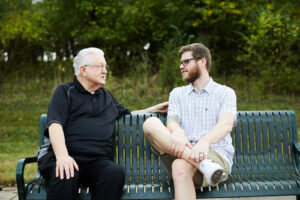
How has your lockdown been?
As we slowly emerge from our homes it has become clear that we have all had differing (in some cases wildly differing) experiences of the last few months. Some have been anxious, busy, bored, distressed, lonely or overwhelmed. Some have been of all of these! But it’s become clear to me, as I talk with people, that very few experiences have been exactly the same.
Even our anxieties seem to have disparate roots. For the last 100-plus days we have been shut in our personal echo chambers with the voices in our own heads and houses. Yes, we have been bombarded by news and media, but the lockdown has had that strange effect of distancing us from any reality that’s not within our four walls. I suppose that was only to be expected and for many of us that has been a mercy. That was, after all, part of the purpose of lockdown – to keep us away from the outside!
As we emerge from lockdown, albeit very slowly, I wonder if we need to re-learn how to listen well, to really hear what other people are saying. Let me explain.
Our worlds shrank dramatically on the 23rd of March and I wonder what we need to do to enlarge these worlds once more. As we creep back out into the world, how can we learn to listen? How do we function as fragile people relating other to fragile people (many of us afraid of how the future might look)?
Fragility requires gentleness. In his book, Gentle and Lowly, Dane Ortlund beautifully articulates what the heart of our Saviour looks like. His focus is Matthew 11:29: “Take my yoke upon you and learn from me, for I am gentle and lowly of heart, and you will find rest for your souls.” This is an invitation to us to find rest in Jesus. And an invitation to learn from our Saviour who is gentle and lowly. This is the way Jesus describes himself to us. What better place to go as we rub up against the world again – to learn from Jesus who describes himself as gentle. There’s Matthew 12:20, too, where Jesus is described in Old Testament language – one who will not break a “bruised reed”. Gentleness encourages us to treat others well.
But it strikes me that, in our anxieties, gentleness can be the first thing to go out the window. When my stress and anxiety increases so does my harshness quotient. As I grow in gentleness, I learn to listen. I become more aware of the fragile person in front of me. I do not want to crush them. I learn to watch my tongue when someone expresses a view that totally contradicts my perspective.
James 3:5 guides my gentleness here. “The tongue is a small part of the body, but it makes great boasts. Consider what a great forest is set on fire by a small spark.” As I learn to listen with gentleness I speak less and I stop to think more. It has been easy to avoid these encounters in lockdown, but as I begin to move back into the world I can say “Tell me more,” because I want to hear more. I will ask with a genuine heart because I want to be like Jesus.
So how do we engage with those friends who flout the social distancing rules with abandon, or our co-workers who irk us, or that family member we’ve enjoyed not seeing? How do we interact with them gently, wanting to hear of their experience? How do we avoid making assumptions about them or judging them or even withdrawing from them to protect this bubble we’ve become so accustomed to?
We have to couple that gentleness with humility, the lowliness of Matthew 11:29. We aim to hear their story with the heart of Jesus. It can be all too easy at the moment to want to withdraw back into our four walls when even an hour of socialising can leave us exhausted. Perhaps in many ways it would be much simpler not to have to genuinely engage with what’s out there but is that where Jesus is leading us – back into our own echo chamber? I think we all know the answer to that! Instead we ask what we can be praying for them, what their fears are. We can lament their sadnesses with them and long – deeply long – for their good, and their growth, even more than our own.
Dane Ortlund encourages us to engage with Jesus’ heart for people and expands on gentle and lowly by describing Jesus as “Tender. Open. Welcoming. Accommodating. Understanding. Willing.” What an extraordinary challenge. After lockdown we are invited to make this the posture of our own hearts towards people. For me, I know I have to put aside my fears and take steps to grow in all these ways so that my gentleness will become ever more apparent. I need to learn how to listen well again.